
Compressed air is useful for a wide variety of jobs in an industrial environment. It can be used to operate many machines from small to large and is relatively cheap and easy to maintain. But, as with any tool in a workplace, there are some health and safety factors to be aware of.
To find out more about which safety guidelines need to be followed when using air compressors, keep reading this handy guide.
Why is compressed air considered dangerous?
Firstly, before we get into the safety tips, we’ll have a look at why air-compressors could be classed as potentially hazardous tools within the workplace.
Often, pressurised air is used to dislodge particles and dirt from surfaces. These particles can be a danger to you because they can enter your eyes or irritate your skin. Or they can become a breathing hazard that can cause irritation in the lungs, eyes and sinuses.
Also, compressed air machines are very loud – if you work around these machines on a daily basis without wearing the correct hearing protection, this could result in hearing loss that builds up over time and may be irreversible.
Safety tips when using air compressors
Wear PPE
For all these reasons, dressing in the appropriate personal protective equipment (PPE) is necessary whenever you use an air compressor. Wearing impact-resistant eyewear and gloves can help to protect your eyes and hands from any flying pieces of dust, dirt or sharp metal particles, and you should also wear hearing protectors and, if possible, a face mask.
Use a Self-Retracting Cord
It is recommended to use an air compressor that features a self-retracting cord. If not, the long cords that lie on the floor create a serious trip hazard. If a worker (or visitor) accidentally trips on the cord, there is the potential for a very serious injury. With a self-retracting cord, excess cord can be tidied away to keep the floor clear and trip-free.
Take It Outside
Unless your air compressor is electrically powered, it is recommended that you only use it outside. This is because diesel air compressors emit fumes that are highly toxic. If the air compressor model specifically states that it can be used indoors, keep it away from moist or wet environments.
Inspect Your Machine
You should check your air compressor before every use, keeping an eye out for any oil or air leaks. If you do find a leak, even if it’s small, using the air compressor becomes very risky and could cause the hose or other components to blow due to the change in pressure. If you find a leak — either oil or air — do not use the air compressor until it has been fixed.
Check The Hose
Make sure that the hose does not bend or kink in use, and that it is properly connected. Always make sure that the ends of the hoses are secured so that they will not whip around if an accidental break in the hose occurs.
You should never crimp or uncouple a pressurised hose. Once you have finished using the machine, make sure to always bleed off the pressure before releasing any connections.
Keep It Clean
Linking back to the last safety tip, you need to have your air compressor professionally maintained and cleaned every now and then. Maintenance helps keep the machine from being prone to combustion and therefore increases the overall security of your workspace.
As long as everything checks out and the air compressor is cleaned regularly, it should be safe to use. Remember to turn off your machine when:
- installing, removing, fine-tuning, or doing any kind of maintenance on connected powered tools.
- a tool malfunctions.
- the tool is not in use.